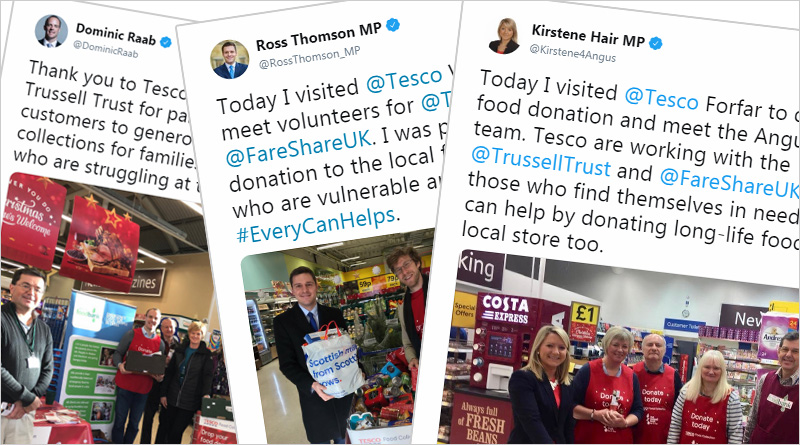Poverty that shames a nation
In a series of acts hinting at a chronic lack of self-awareness and a collective failure to anticipate public reaction, various Conservative MP’s last week visited Tesco food banks to donate and to show their support for those that volunteered their time.
Dominic Raab, who, lest we forget, was until recently the Brexit secretary who “hadn’t quite understood” the importance of cross-Channel trade to the UK economy, tweeted:
“Thank you to Tesco in Molesey and the Trussell Trust for partnering to encourage customers to generously provide food collections for families in our community, who are struggling at this time of year”.
As Rhiannon Cosslett wrote in the Guardian, it was the sheer brass balls of Raab and his colleagues that irked the most. These were the very people who were themselves in some part responsible for the exponential growth of food banks. Those who “voted in favour of the bedroom tax, against raising welfare benefits at least in line with prices, and against paying higher benefits over longer periods for those unable to work due to illness or disability”
It wasn’t as if the honourable members had acted spontaneously, either. Adding to the egregiousness of the situation, it emerged that four Scottish Tory MP’s had tweeted out almost the exact same message urging constituents to follow their lead and “help by donating any long life food to your local store”. But at least there was some sort of safety in numbers this time. In 2015 when the then lone Scottish Tory MP David Mundell opened a foodbank in Dumfries, he was met with calls of “shame on you” and effectively run out of town by locals drawing attention to his “sheer hypocrisy”.
Britain’s largest food bank network, The Trussell Trust, who work closely with Tesco also came in for criticism – mostly for its rather crass publicity which announces that “every town should have one” and for its historic links to the Conservative party itself.
And was it not current darling of the right, Jacob Rees Mogg, who in 2017 told LBC radio that the growing use of food banks in the UK was “rather uplifting” and “shows what a good compassionate country we are”?
Good and compassionate we may be, but the existence of food banks is a national disgrace. As journalist and campaigner Owen Jones has pointed out, Britain is staggeringly rich. We have 134 billionaires and in 2017 the fortunes of the wealthiest 1,000 individuals reached £658bn, a surge of 14% compared with the year before. And as we approach the climax of the festive season it’s worth noting that according to accountancy firm Deloitte, the average Briton will have spent £576 between Black Friday and Christmas day.
And yet food banks exist and continue to be used in ever growing numbers. The Trussell Trust is, according to its website, in control of over 420 foodbanks, in more than 1,200 centres across the UK. In the last year alone it gave 1,332,952 three day emergency food supplies to people in crisis. In its most recent press release, as it prepares for the busiest Christmas yet, the Trust said:
“December was the busiest month for foodbanks last year. During December 2017, The Trussell Trust’s network provided 159,388 three-day emergency food supplies to people in crisis; 65,622 of these went to children. This is a 49% increase on the monthly average for the 2017-18 financial year.”
To use the phrase so beloved of politicians of any hue, let’s be quite clear about the increase in foodbank usage: it’s do with government welfare policy and the implementation of Universal Credit. Ostensibly created to simplify the overcomplicated benefit system, Universal Credit combines the six old benefits – including housing benefits and income support. Crucially, though, the system of applying the new practice has meant that claimants are left to wait six weeks before they get their benefits and incidents where the waiting times have gone past ten or twelve weeks are not unknown. In the words of Nicholas Timmins of the Institute for Government:
“The overall effect has been to plunge people already on low incomes into rent arrears and debt and in some cases homelessness. In others cases, it has caused job losses – the very opposite of what Universal Credit is intended to achieve.”
Tragic stories about Universal Credit and the hugely damaging consequences for some people are beginning to gain greater currency. There are cases of women turning to prostitution to survive whilst a recent report by academics in Newcastle and Teeside found that UC “adversely affected claimant’s financial security, physical and mental health, social and family lives and employment prospects”.
The Western Mail has highlighted the personal level of despair in Wales. As reported by Estel Farrell – Roig at Neath Port Talbot Council, housing tenants were being handed eviction notices as a direct result of the benefits change. The senior housing officer at the local authority warned that the new system is having a “massive impact”.
In November, Philip Alston, the UN’s rapporteur on extreme poverty and human rights spent two weeks in the UK fact finding. In a 24 page report he declared that in a country of such wealth It thus seemed:
“patently unjust and contrary to British values that so many people are living in poverty. This is obvious to anyone who opens their eyes to see the immense growth in foodbanks and the queues waiting outside them, the people sleeping rough in the streets, the growth of homelessness, the sense of deep despair that leads even the Government to appoint a Minister for suicide prevention and civil society to report in depth on unheard of levels of loneliness and isolation.”
As Alston so accurately stated, the full picture of low-income well-being in the UK cannot be captured by statistics alone.
Poverty and desperation are human conditions and they exist most shamefully in this country of cuts, austerity and social inequality.


